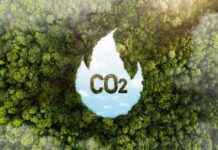Japan’s Missed Opportunity: A Closer Look at the 2035 Emissions Target
Japan recently found itself in the global spotlight after missing a UN deadline for submitting its updated 2035 emissions reduction target. The government’s proposal of a 60% cut in emissions by 2035 was met with significant public feedback, with over 80% of comments received calling for more ambitious goals. Despite this overwhelming response, Japan decided to stick with its initial target, sparking disappointment among environmental advocates and experts.
Yoko Mulholland, a senior policy advisor at think-tank E3G, expressed her disappointment, stating, “It is very disappointing that the Japanese government ultimately decided to proceed with a low NDC target, despite claiming its NDC submission was delayed due to reviewing feedback.” The delay in submitting the target was reportedly due to the extensive public comments received, which demonstrates the high level of public engagement on this critical issue.
On February 18, Japan submitted its updated Nationally Determined Contribution (NDC) to the UN, outlining its goal to reduce greenhouse gas emissions by 60% from 2013 levels by 2035 and by 73% by 2040. This decision was made despite calls for higher targets from various stakeholders, including green groups at home and abroad. Climate Action Tracker’s analysis suggested that Japan should aim for an 81% reduction in emissions by 2035 to make a truly significant contribution to global climate action.
Reevaluating Energy Policies: A Shift Towards Renewables and Nuclear Power
In addition to its emissions reduction targets, Japan also finalized its revised energy strategy, which includes plans for renewables to make up 40-50% of the country’s electricity mix by 2040, with nuclear power contributing another 20%. This marks a departure from the government’s previous stance of reducing reliance on nuclear power following the Fukushima nuclear disaster in 2011.
Masayoshi Iyoda, a campaigner for 350.org Japan, criticized Japan’s new energy policies, stating that they prioritize “false solutions, such as fossil gas, nuclear, ammonia-coal co-firing power, and carbon capture and storage (CCS),” without a clear pathway to phasing out fossil fuels. The decision to include nuclear power and fossil fuels in Japan’s energy mix has raised concerns among environmental advocates about the country’s commitment to transitioning to cleaner energy sources.
Looking Towards the Future: Japan’s Role in the Global Energy Transition
Japan’s energy policies and emissions targets have far-reaching implications for the global energy transition. With its significant investments in energy-related infrastructure, Japan has the potential to influence the trajectory of the Asia-Pacific region’s energy landscape. The Asia Zero Emission Community, established by former Prime Minister Fumio Kishida, aims to promote fossil fuel-related investments across Southeast Asia, signaling Japan’s continued support for such projects.
Ollie Wilson, head of the Climate Group’s RE100 campaign, emphasized the importance of Japan seizing the opportunity to become a clean energy frontrunner. He urged Japan to prioritize renewables and enhance its climate commitments, noting that its current NDC falls short of demonstrating true climate leadership on the global stage.
A Linear Pathway to Net Zero: Japan’s Climate Goals
Japan’s emissions reduction targets for 2035 and 2040 are part of a linear trajectory towards achieving net zero emissions by 2050. The government’s commitment to this pathway is seen as a crucial step in demonstrating its dedication to long-term emission reductions and economic growth. By setting clear goals and timelines for emissions reduction, Japan aims to enhance predictability in its climate action efforts.
Despite Environment Minister Asao’s promise to submit an NDC aligned with the 1.5-degree goal, environmental groups have raised concerns about the adequacy of Japan’s targets. The Renewable Energy Institute (REI) highlighted discrepancies in the government’s interpretation of the IPCC’s latest assessment report, suggesting that Japan’s targets may fall short of putting the world on track to limit global warming to 1.5 degrees Celsius.
By choosing 2013 as a baseline for emissions cuts, Japan’s climate track record may appear more favorable than it actually is, according to REI. The think-tank argued that using a different reference year could provide a more accurate assessment of Japan’s progress towards its emission reduction goals. As discussions around climate action continue to evolve, it remains crucial for countries like Japan to reevaluate their strategies and enhance their commitments to combating climate change.














